PRINCETON, NJ -- During a week of intense government focus on jobs, punctuated by the president's jobs summit, the Gallup Job Creation Index -- based on U.S. employees' self-reports of hiring and firing activity at their workplaces -- shows that November job-market conditions nationwide failed to match even the modest job-market improvements of recent months. As a result, they remain about where they were in October. The South continues to be the strongest region while the West remains the weakest and is worsening. Job conditions also deteriorated in the East during November and were unchanged in the Midwest.
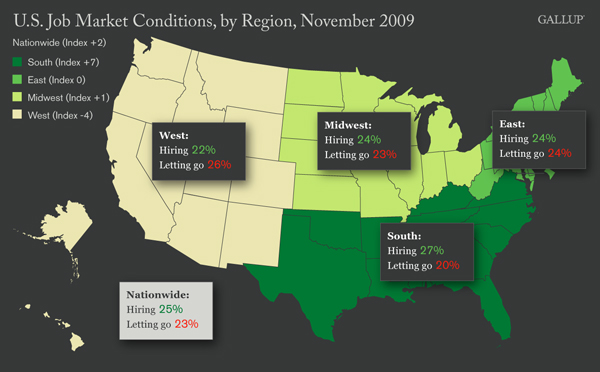
Nationwide, job-market conditions are much better than they were earlier this year. However, Gallup's Job Creation Index also shows that the job situation remains much worse than it was just after the recession began, in January 2008. The lack of improvement in jobs during November tends to emphasize the dire situation facing policymakers as they contemplate job creation in 2010.
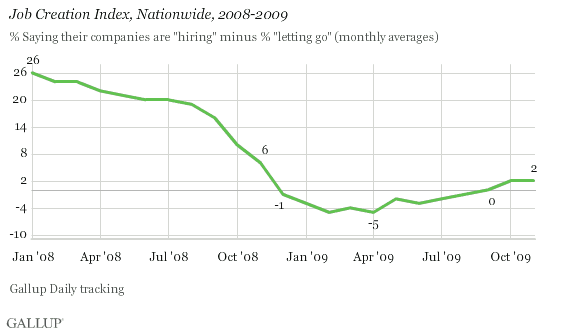
East: Gives Up October's Gain
Job-market conditions in the East fell back to zero in November from October's +4 -- retreating to the range of the prior two months. Hiring fell back, with 24% of workers reporting that their employers are hiring new employees and expanding the size of their workforces -- down from 27% in October and the same as in September. Twenty-four percent said their companies are letting people go, which is essentially the same as the October and September readings. Gallup's Job Creation Index suggests job conditions in the East and Midwest are about the same, with the South doing better while the West is doing worse. Although job-market conditions in the East seem to reflect the end of the financial crisis, they also tend to reflect the continuing fallout of the economic downturn of the past couple of years.
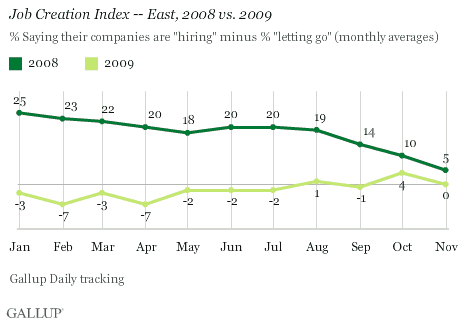
Midwest: Conditions Unchanged
Midwestern job-market conditions were unchanged for the third month in a row in November, with Gallup's Job Creation Index remaining at +1. Twenty-four percent of workers reported that their companies are hiring while 23% said their companies are letting people go -- identical to the September and October numbers. Hiring continues to exceed layoffs marginally in the Midwest, suggesting that labor-market conditions have stabilized but also not reflecting the improvement many had hoped for with the bailout of the nation's domestic auto producers, the "cash for clunkers" program, and the positive impact on exports of the steadily declining value of the dollar. Job-market conditions in this region remain far below those of January 2008.
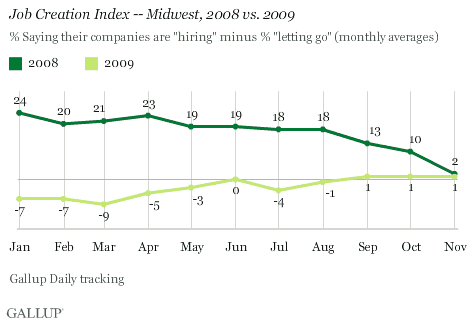
South: Best Job Market in November
Job-market conditions in the South were the best for any region in November (with a Job Creation Index of +7), as was true in October (+6). Both months were up from September. While 27% of workers in November reported that their employers are hiring, down two points, the percentage laying off declined by three points, leaving the net job situation essentially unchanged from October. The South continues to show the best hiring picture and fewest layoffs of any region, probably reflecting in part today's comparatively high gas and oil prices.
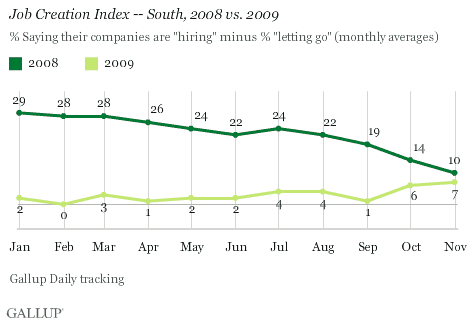
West: Worst Job Market and Deteriorating
Gallup's Job Creation Index in the West worsened to -4 in November from -2 in October. A region-low 22% of employees say their companies are hiring while 26% say they are letting employees go, a regional high. If the falling dollar and increasing exports are helping business activity in the West, this is not reflected in the current job market. Job-market conditions in the West show improvement from earlier in 2009, but are well below their January 2008 level.
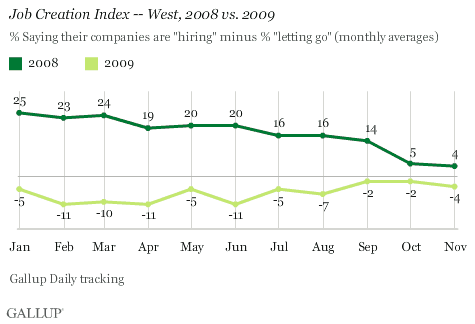
Commentary
As President Obama holds a jobs summit Thursday, Gallup data show that about one in three Americans (35%) think the job market in the United States will get better over the next 12 months. Dismal as these expectations may be, they make sense given the grudging improvement in job-market conditions over the past several months, topped off by the lack of improvement in November. While Wall Street has surged 60% since its March low, Gallup's Job Creation Index shows hiring has increased two points, from 23% to 25%, during that time. Further, hiring remains at just 22% in the West and continues to trail behind layoffs.
On Friday, the government will report November's unemployment rate. Wednesday's ADP jobs report shows a loss of 169,000 jobs last month, while Challenger, Gray, & Christmas report that November planned layoffs totaled 50,349. Consistent with these findings, Gallup's Job Creation Index suggests that the unemployment rate will remain at 10.2% and could go higher.
Regardless of the actual numbers reported, it seems clear that action needs to be taken to change the jobs situation. Jobs are the key to rebuilding consumer spending and maintainable economic growth. They are also a key issue politically, as illustrated by Gallup's finding that 40% of Americans approve of the president's handling of "creating jobs," while 55% disapprove.
What is needed now is a way to find consensus on how to change not only Americans' current perceptions of the job market but also their current everyday reality. If the president's jobs summit can make significant progress toward finding such a job-creation consensus, then it will provide the nation with a much-needed Christmas gift.
Survey Methods
For Gallup Daily tracking, Gallup interviews approximately 1,000 national adults, aged 18 and older, each day. The Gallup consumer spending results are based on random half-samples of approximately 500 national adults, aged 18 and older, each day. The Gallup Job Creation Index results are based on a random half sample of approximately 250 current full- and part-time employees each day.
Regional results for November are based on Gallup Poll Daily tracking interviews totaling more than 1,800 in all regions. For the total regional samples of these surveys, one can say with 95% confidence that the maximum margin of sampling error is ±3 percentage points.
Interviews are conducted with respondents on land-line telephones and cellular phones.
In addition to sampling error, question wording and practical difficulties in conducting surveys can introduce error or bias into the findings of public opinion polls.
